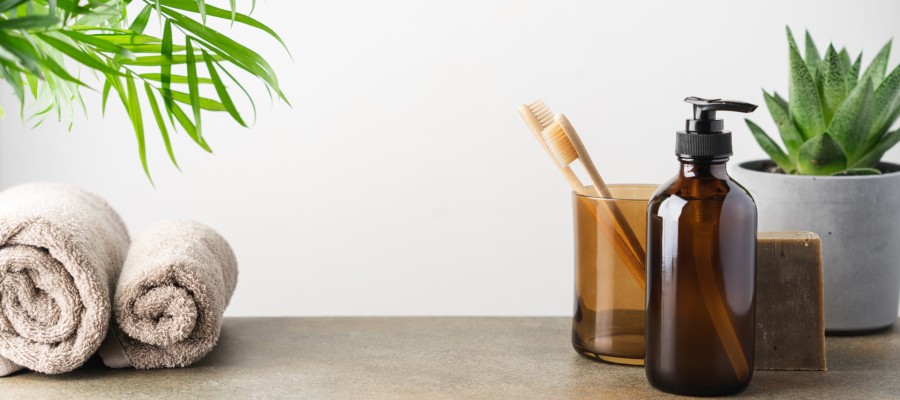Build a self-care routine kinder to animals by swapping these common animal-derived ingredients for plant-based alternatives

If you’re interested in making more conscious choices beyond food, then looking at your beauty routine is a great place to start. Unfortunately, many of the ingredients that can be found in your everyday cosmetic products are likely to be derived from animals, from makeup and skincare products to hair and nail treatment. We've put together a list of the most common animal-derived ingredients and advice on how you can opt for vegan-friendly alternatives instead.
Glycerin
Glycerin is one of the most common animal-derived ingredients found in cosmetics. It is made from animal fat and used in fragrances, hair products, oral care products and moisturisers to name a few. Look out for products that use vegetable-based glycerin instead, and if you’re ever unsure, check the product for reliable vegan certification.
Collagen
Collagen is a protein taken from the bones, skin, ligaments and tissues of cows which can be found in creams, lotions and serums. Swap products that use animal-derived collagen for more ethical alternatives, such as soya protein and almond oil.
Tallow
Tallow is a common ingredient found in soap, foundation, nail polish and eye make-up and is made from the fat of farmed animals. Thankfully there are animal-free alternatives to tallow-based products which use cold pressed pumpkin seed oil, virgin olive oil, coconut oil or jojoba oil instead.
Animal hair
Animal hair is often used in cosmetic items such as make-up brushes or false eyelashes. Make a more conscious choice by opting for synthetic products that are free from animal ingredients. These will be made from materials like nylon, polyester or other plastic fibres.
Beeswax
Beeswax is used in many cosmetic products as a stiffening agent. However, did you know candelilla and carnauba wax are great vegan-friendly alternatives to beeswax? They can be used in lip balms, soaps and moisturisers to prevent liquids from separating.
Ambergris
Ambergris is a solid waxy substance originating in the intestine of the sperm whale. It is sometimes used as a fixative in the perfumery industry for high-end scents. Luckily, vegan alternatives to ambergris exist; several botanical alternatives can mimic the aroma and properties of ambergris. Essential oils derived from plants, as well as synthetics, are used in plenty of affordable and high-end vegan perfumes now on the market.
Keratin
Keratin is a popular ingredient which aids the strengthening of hair and nails. It is found in many products, such as shampoo, conditioner and nail polish. However, this protein is often derived from the hair and horns of various animals, most commonly farmed animals. Look for vegan-friendly cosmetics that use plant-derived proteins instead, such as hydrolysed wheat, soya and corn.
Carmine
Carmine is an ingredient made by crushing insects and can be found in cosmetics such as coloured lipsticks, blushes and nail polishes to pigment them with red and purple hues. However, there are many plant-based ingredients which can also achieve this effect and are labelled vegan!
Oestrogen
Oestrogen is a hormone added to anti-ageing creams to increase their effectiveness and is obtained by extracting urine from pregnant horses. Vegan-friendly alternatives include phytoestrogens (plant estrogens) that can be derived from grapes, soybeans, flaxseed and various nuts and berries.
Squalene
Squalene is extracted from a shark’s liver and can be found in deoderants, lip balms and moisturisers. This ingredient shares its name with a plant-based product so it’s advisable to research which one your chosen brand uses before purchasing.
 We hope this list offers insight into how you can switch up your beauty routine to make more conscious choices every day. You don’t have to memorise all of these ingredients, as you can always check brands and their products for reliable vegan certification if you are in doubt. To find out more about making kinder choices to animals every day, visit our Conscious Choices campaign page and be sure to follow our #ConsciousChoices campaign on Facebook, Instagram and X.
We hope this list offers insight into how you can switch up your beauty routine to make more conscious choices every day. You don’t have to memorise all of these ingredients, as you can always check brands and their products for reliable vegan certification if you are in doubt. To find out more about making kinder choices to animals every day, visit our Conscious Choices campaign page and be sure to follow our #ConsciousChoices campaign on Facebook, Instagram and X.
References:
-
Cizmarova, B., Hubkova, B., Bolerazka, B., Marekoba, M. and Birkova, A. (2020). Caffeic acid: a brief overview of its presence, metabolism and bioactivity, Bioactive Compounds in Health and Disease, 3(4): 74-81. [online] Available at: (PDF) Caffeic acid: a brief overview of its presence, metabolism, and bioactivity (researchgate.net) [Accessed 07.07.2023]
-
Cherney, K. (2019). Can a Banana Face Mask Help the Health of Your Skin? [online] Available at: Banana Face Mask Benefits for the Skin and How to Try It (healthline.com) [Accessed 07.07.2023] - Medically reviewed by Cynthia Cobb, DNP, APRN, WHNP-BC, FAANP from Walden University and University of Louisiana
The views expressed by our bloggers are not necessarily the views of The Vegan Society.

